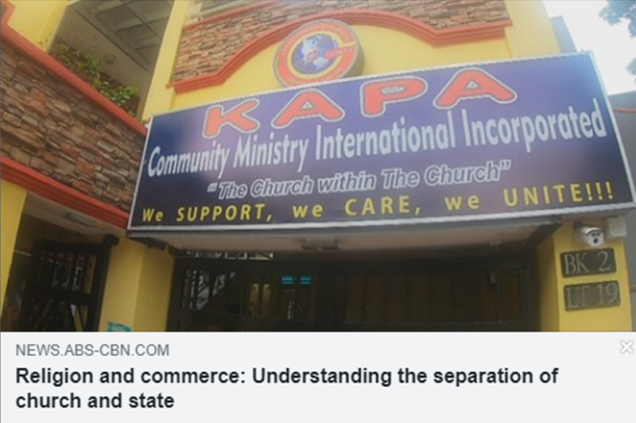The Kapa Ministry Issue: The Separation of Church and State Explained

MEDIA PICKED up on the questionable activities of Kapa (Kabus Padatoon or poor will be rich) Community Ministry Inc., a Surigao del Sur-based religious group, when President Rodrigo Duterte ordered it shut down in a TV guesting, saying it is running an investment scam. Members were quick to call it an attack on religious freedom and invoked the separation of church and state which much of the news did not explain.
CMFR cheers news.ABS-CBN.com for its report explaining the principle of the separation of church and state in connection with the controversy involving Kapa Ministry.
The online arm of ABS-CBN News published “Religion and Commerce: Understanding the separation of church and state” on June 25. ABS-CBN News interviewed Fr. Ranhilio Aquino, dean of the San Beda Graduate School of Law, who explained that “While it is true that every religion and the members of a religious sect are free to exercise their religion, the moment they engage in certain activities that are government-regulated, they have to submit to government regulations.” He added that state policies on cooperatives, corporations and micro-financing operations must be observed.
The Kapa Ministry was founded in 2015 by Joel Apolinario, a former radio technician and disc jockey. It made the national spotlight when President Duterte slammed its alleged investment scheme on June 8 while he was a guest on Pastor Apollo C. Quiboloy’s television show Give Us This Day, which airs on SMNI, the pastor’s broadcasting network.
Media reported that Kapa requires a minimum of PHP10,000 in “donations” from members for use in propagating the faith and in its livelihood programs. Donors are told they will receive a 30% monthly return in what amount to investments. Kapa reportedly has five million members.
The Securities and Exchange Commission (SEC) has been investigating Kapa since 2018 and revoked Kapa’s incorporation papers in April this year, saying its investment program is a Ponzi scheme. The scheme generates returns for current investors by acquiring new members, the reports explained. The National Bureau of Investigation (NBI) filed syndicated estafa charges against Kapa officials.
Explaining further, Aquino said “Freedom of religion in so far as the concern is belief, is absolute. You can believe anything that you want to. But the moment that you commit an overt act based on your religion, that will be subject to state supervision.” He said that religious organizations engaged in activities regulated by the government cannot invoke the separation of church and state to evade accountability. While media reports made clear how Kapa’s investment scheme is unsustainable because the organization lacks the financial capability to generate the necessary funds to sustain the high returns, it took a while before the separation doctrine was discussed.
Leave a Reply